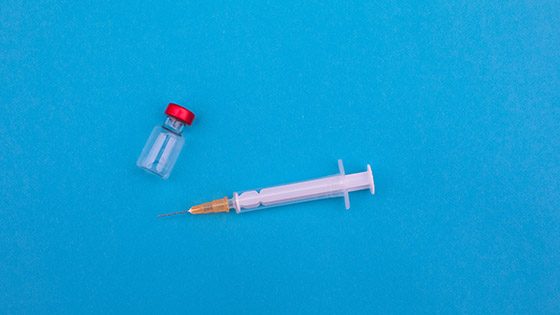U-M Expert, Leukemia Survivor Discusses Why He Plans to Get the COVID-19 Vaccine

Q&A with Ryan Malosh
Assistant Research Scientist
Ryan Malosh is an assistant research scientist at the University of Michigan School of Public Health whose research focuses on infectious disease and vaccine effectiveness. He discusses why he's been socially isolating since late 2018 when he was diagnosed with leukemia.
Malosh says getting as many people vaccinated as possible will be key to stopping the spread of the COVID-19 pandemic. Until then, he says, public health measures such as social distancing, wearing a mask and hand washing continue to be people's best protection.
When did you first start social distancing, wearing a mask in public, working from home and why?
I was diagnosed with leukemia in November of 2018 and I underwent about three months of chemo and then a bone marrow transplant. And so all during that process, I was immunocompromised and I had to wear a mask, not only in public, but even around my own kids, when they were sick in our house. I had to wear a mask and I had to stay isolated from people as much as possible.
I was set to return to work at the School of Public Health on March 9, 2020. That was the one-year anniversary of my bone marrow transplant. And then the pandemic started to really take off in this country right around that time. I think schools closed at the end of that week. And I had been watching some of the cases take off in Seattle and New York and decided it was too risky to come out of isolation.
Based on your personal experience and your professional experience, what would you say to someone who's reluctant to get the vaccine?
I would say that there's a lot of people like me who might not look like they're vulnerable to infection or that they would have severe consequences if they got infected. If we all do our part and get vaccinated, and continue to wear masks and socially distance in the meantime, we can really protect people who might have really bad outcomes from getting this disease.
What would you like people to know?
It's really important that people know that a vaccine doesn't save lives, but vaccination saves lives. So it's been remarkable to see the trajectory and the speed with which we were able to get this vaccine from the early stages now to the authorization of one of the vaccines for use in the United States. And that's awesome. And it is great that that worked out the way it did. But it doesn't mean anything unless we start to use the vaccine and have actually people get vaccinated.
When that vaccine is available, will you get it?
Yes, absolutely. I will get vaccinated as soon as I'm able to. It sounds like they may not approve the current formulations for immunocompromised people right away, but as soon as my number comes up, I'm going to be sure to get into my doctor's office and get vaccinated.
Why are you so convinced that the vaccine is safe and you're willing to roll up your sleeve right away?
Well, it's actually kind of interesting. I've been getting all my childhood vaccines again since the bone marrow transplant wipes out your immune system. And I've had to get everything from MMR to pneumococcal vaccines to shingles vaccines, pretty much the whole gamut. And I really think we're lucky in this country that we have access to those technologies. These diseases, they kill people. Measles kills people around the world.
We don't necessarily recognize that risk because we don't see it in our daily lives, but it's because of vaccines that we don't see it in our daily lives. And so just knowing a bit about the history of vaccine-preventable diseases, I really believe that the systems we have in place to monitor the safety and the effectiveness of these vaccines are good and important.
Has having leukemia changed how you look at your job as an epidemiologist?
Battling leukemia has really focused my attention in terms of preventing infections for those who might have the most serious problems or serious complications from an infection. I have always been interested in vaccines and how vaccines work to prevent infection. But I'm a lot more interested now in preventing infections in the most vulnerable populations and how we can use vaccinating close contacts to really drive protection for people who can't get vaccinated themselves.
Do you think that's going to be the biggest challenge is getting people to do it and then do the second dose?
There's a lot of people who don't trust the vaccine for various different reasons. Some people think it went too fast, some people don't trust the government for totally legitimate reasons. There's a lot of people who just are leery of putting something in their body. Those are all things that we need to acknowledge and sort of recognize as valid concerns. But we're doing what we can to monitor the vaccine's safety. We're going to continue to do that. The safety profile looks really good right now, and it looks like it's a really effective vaccine.
We should sort of try to be honest with people and open, and hopefully we can build trust and convince them that vaccination is the right thing to do.
